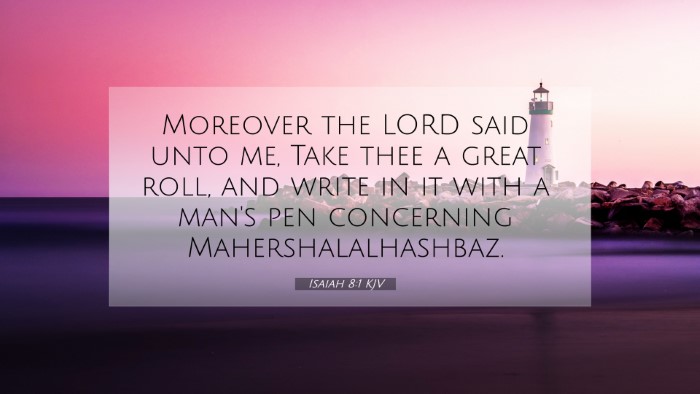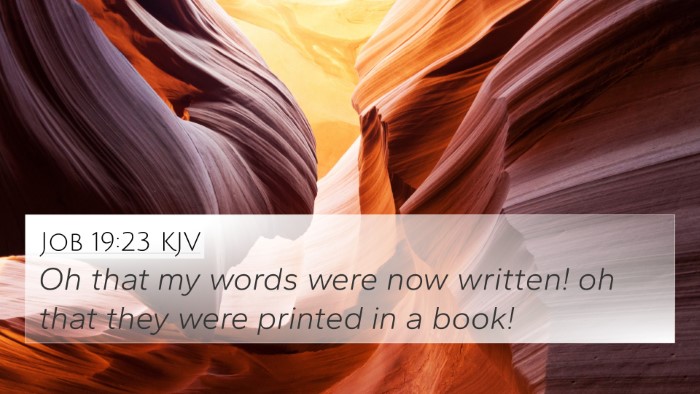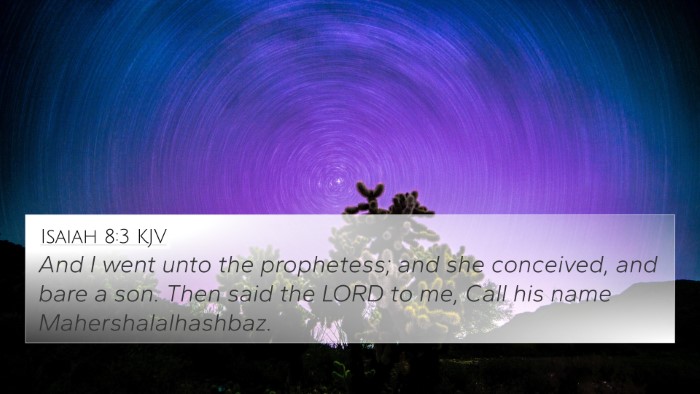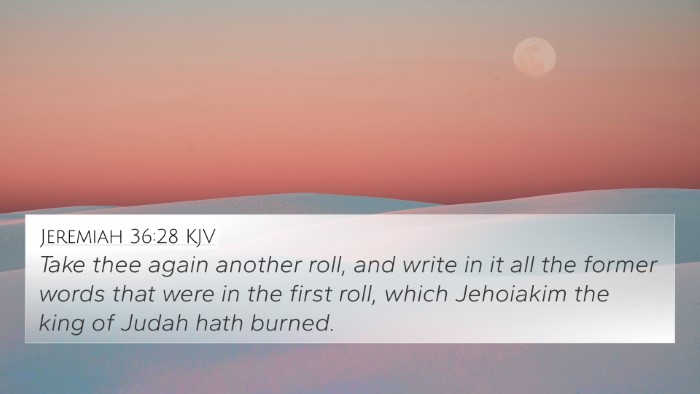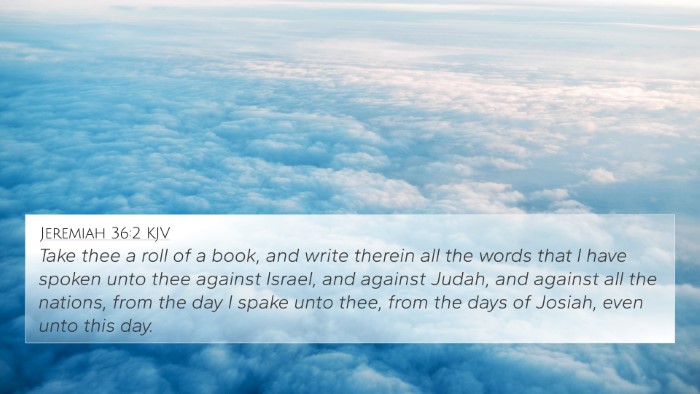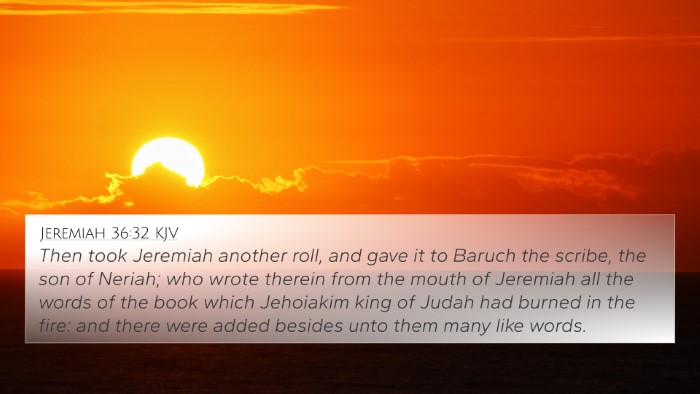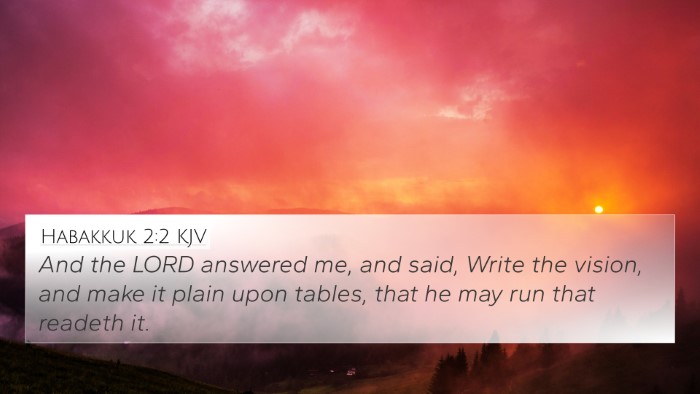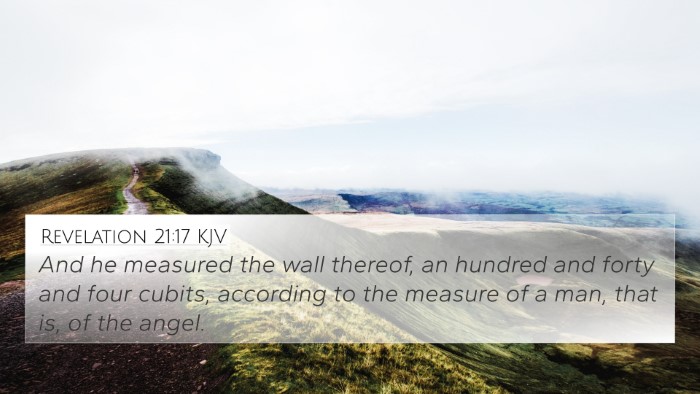Understanding Isaiah 8:1
Verse: "Moreover the LORD said unto me, Take thee a great roll, and write in it with a man’s pen concerning Mahershalalhashbaz." (Isaiah 8:1)
This verse is significant for the context of Isaiah's prophetic ministry. In this passage, God commands Isaiah to take a large scroll and inscribe a message on it using a common writing tool. The message concerns a child named Mahershalalhashbaz, whose name means “swift is the booty, speedy is the prey.” The act of writing down this prophecy served as a public announcement of God’s impending judgment.
Commentary Insights
- Matthew Henry: Emphasizes that the name Mahershalalhashbaz is prophetic in nature, indicating a swift victory that would come to Israel’s enemies. This reflects God’s sovereignty and foreknowledge.
- Albert Barnes: Relates this act of writing on a roll to the traditions of prophetic order within Israel, highlighting that such actions had public significance and were meant to serve as a warning to the people.
- Adam Clarke: Points out the Hebrew implications of the name and the urgency it conveys about the impending disaster for the house of Israel. The scroll symbolizes God’s unchanging word and the importance of recording His directives for remembrance.
Bible Cross-References
Several scriptures relate directly to the themes and implications found in Isaiah 8:1:
- Isaiah 7:14: Prophecy concerning Emmanuel, further establishing the connection in Isaiah’s prophetic ministry.
- Isaiah 9:6: Recognition of the significance of names in Isaiah’s prophecies parallel to Mahershalalhashbaz.
- Jeremiah 30:2: God commanding Jeremiah to write down prophecies, showing the continuity of prophetic actions in Scripture.
- Ezekiel 2:9-10: The act of writing down God's words, reinforcing the importance of documentation in prophetic ministry.
- Revelation 1:11: Calls for writing down prophetic messages, bridging the Old and New Testament practice of proclamation.
- Habakkuk 2:2: "Write the vision, and make it plain," reaffirming the importance of clarity in delivering God’s messages.
- Luke 1:76: A connection to the prophetic role and actions of John the Baptist, mirroring the urgency found in Isaiah's commission.
- Matthew 2:15: The fulfillment of prophecies being inscribed, drawing a link between past and present prophetic words.
- 2 Peter 1:21: The notion of prophecy being divinely inspired and recorded, highlighting the significance of written prophecy.
- Hebrews 12:25: References the importance of heeding the prophetic words in Scripture, linking back to the necessity of Isaiah's recordings.
Themes and Connections
This verse ties into several overarching themes within Scripture such as:
- The Authority of Prophecy: Each instance where God commands writing down prophetic messages emphasizes the weight and authority of divine revelation.
- The Fulfillment of God's Word: The connection and eventual fulfillment of these prophecies highlight God's faithfulness and sovereignty.
- The Role of the Prophet: Understanding Isaiah's role as a prophet who communicates God's message parallels the function of prophets throughout the Bible.
- Divine Judgment and Mercy: The theme of warning against impending judgment is a common thread connecting many of the prophets, serving to draw people back to repentance.
Conclusion
Isaiah 8:1 serves as a crucial starting point for understanding the dynamics of prophetic ministry in the Old Testament. The command to write is an expression of God's intention to make His plans known, contributing to the broader narrative within Scripture that intertwines God’s messages of judgment with those of hope and salvation. By employing tools for Bible cross-referencing, readers gain deeper insights into the connections between various passages, enhancing their understanding of the inter-related nature of Scripture.
By studying these connections, believers can see the meticulous plan of God unfold across Scriptures, recognizing familiar themes and engaging in comparative Bible verse analysis to bolster their faith and understanding of divine truth.


